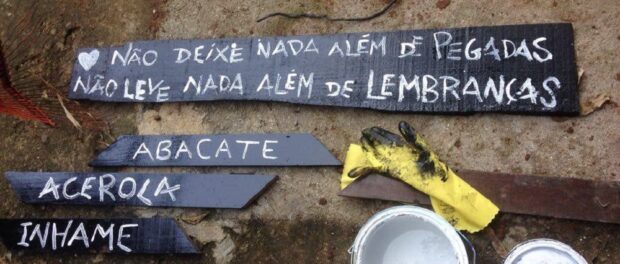
On Sunday December 6, over twenty residents and collaborators gathered in Vila Laboriaux to plant and revive a vacant plot located at one of the highest points of the community. Once threatened with removal, the small community bordering the Tijuca National Park at the top of Rocinha continues to implement sustainable development and community improvement projects that connect residents with their surrounding environment.
Social inclusion and sustainability non-profit Favela Verde works closely with residents on projects such as community-based ecotourism, local collaborative trails with the Tijuca National Park, and environmentally-focused outdoor movie nights. Vila Laboriaux’s latest socio-environmental project is to transform a plot of previously overgrown land into an urban edible forest, which will be accessible to the community.
After extremely heavy rains during April 2010, Vila Laboriaux suffered significant damage, including the destruction of houses that previously occupied this plot of land. Since then, the land has remained empty. Now residents and collaborators are working to transform valuable space into something productive for the community.
Sunday’s event was a collaborative effort hosted by Favela Verde, the Vila Laboriaux and Vila Cruzado Residents Association, Projeto Capim Limão from the Federal University of Rio de Janeiro (UFRJ), community ecotourism group Caminhos do Largato, the Tapéporã tourism company, and MASK, an education and ecotourism group. The afternoon’s event was relaxed and inclusive. Before beginning the work, the participants gathered to introduce themselves and share their personal goals for the day as well as how they were feeling at that moment. Positive energy and excitement for the project were unanimous. “I am feeling very happy to receive everyone here for the first step of this cool project,” said Henrique Nascimento, an organizer from Favela Verde and Tapéporã.
The aim is to create a food forest based on agroforestry techniques. The garden’s edible plants will include avocado, corn, beans, banana, and yam. Favela Verde organizer Wallace Mesquita explained: “What we want to do here is create a system where we do not have the need to interfere, the system will take care of itself. That’s the concept of permaculture. Agroforestry shares this dynamic of self-sufficiency, a self-sufficient forest.”
The group collectively brainstormed tasks for the day, which included mixing and preparing the earth, removing trash from the plot, identifying the edible plants for the garden, making signs for the plants, and keeping both the plants and participants hydrated. Henrique Nascimento emphasized that the activities of the day should be “self-organized.” Instead of one person directing and overseeing the tasks, each individual was responsible for contributing in any way they wanted and felt most comfortable. Everyone selected tasks from the collectively brainstormed list of work and began transforming the space. As the afternoon continued, more people joined the work and young residents passing by stopped to take a look at progress made.
Located next to a school, the hope is that the garden will provide an entry-point to incorporating environmental education into the students’ curriculum. The edible garden has the potential to be a source of both food and knowledge.

“I want this to be a beautiful space to visit. We will have a lot of pride in this garden,” said resident and Favela Verde participant Diogo Barbosa.
On top of past collaborative efforts, Vila Laboriaux is further cultivating a sense of community and shared space through this latest project.


